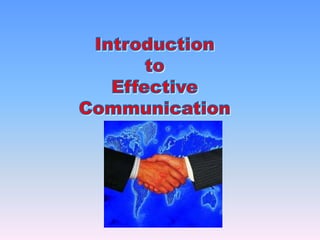
Communication Presentation
- 2. Objectives To consider verbal and non-verbal Communication methods To understand and practise effective listening skills To communicate in clear, respectful and non- judgemental ways To know when to seek advice
- 3. Cultural Diversity What do we know about the communication styles of different cultures? Consider verbal and non verbal, including dress constraints, language difficulties, taboos.
- 4. Why do we need a high level of Communication? • Communication is a hugely important aspect of the Client-Relationship. • Effective communication skills are a critical element in our career and personal lives. • So how exactly do we communicate? Clearly with such a range of different clients, there is no "one size fits all" communication approach. Some clients want lots of communication. Some want very little. • We all must use a variety of communication techniques to both understand and be understood
- 5. Why is communication important Inspires confidence Builds respect in business and social life Helps make friends Develops a distinct personality Reveals your ability to others
- 6. What is Communication? What does it mean to you? The process of communication is what allows us to interact with other people; without it, we would be unable to share knowledge or experiences with anything outside of ourselves. Common forms of communication include speaking, writing, gestures, touch and broadcasting.
- 7. What are the most common ways we Communicate? Written Word
- 8. Critical success factor The majority of your perceived ability comes from how you communicate 38% Visual 55% Tonal 7% Verbal 93% of all Communication is non verbal - SKILL
- 9. Communication Goals To change behavior To get action To ensure understanding To persuade To get and give Information
- 10. The Communication Equation • What you hear Tone of voice 40% of the message Vocal clarity Verbal expressiveness • What you see or feel Facial expression Dress and grooming 50% of the Posture message Eye contact Touch Gesture • WORDS … 10% of the message!
- 11. Understanding Communication • We are going to consider: The 2-Way communication process Effective communication skills Barriers to effective communication
- 13. Effective Communication Skills Effective Communication skills Eye contact & visible mouth Body language Silence Checking for understanding Smiling face Summarising what has been said Encouragement to continue Some questions
- 14. Barriers to Effective Communication Barriers to effective communication Language NoiseTime DistractionsOther people Put downsToo many questions Distance Discomfort with the topic Disability Lack of interest
- 15. How to Improve Existing Level of COMMUNICATION? Improve language. Improve pronunciation. Work on voice modulation. Work on body language. Read more Listen more Avoid reading or watching or listening unwanted literature, gossip, media presentation etc. Interact with qualitative people.
- 16. The Art of Listening • “If we were supposed to talk more than listen, we would have been given two mouths and one ear.”
- 17. Hearing Vs Listening Hearing – Physical process, natural, passive Listening – Physical as well as mental process, active, learned process, a skill Listening is hard. You must choose to participate in the process of listening.
- 18. Techniques to improve listening skills PARAPHRASE Restate what was said in your own words SUMMARIZE Pull together the main points of a speaker QUESTION Challenge speaker to think further, clarifying both your and their understanding
- 19. How to be an active listener Set the stage Ensure mutual understanding Understand body language Suspend judgment Avoid Behaviors that hinder effective listening Act distracted (look at your watch!) Tell your own story without acknowledging theirs Give no response Invalidate response, be negative Interrupt Criticize
- 20. Stages of the Listening Process Hearing Focusing on the message Comprehending and interpreting Analyzing and Evaluating Responding Remembering
- 21. Responding Responses to check that your perceptions are correct Responses to encourage further communication
- 22. Always think ahead about what you are going to say. Use simple words and phrases that are understood by every body. Increase your knowledge on all subjects you are required to speak. Speak clearly and audibly. Check twice with the listener whether you have been understood accurately or not In case of an interruption, always do a little recap of what has been already said. Essentials of communication dos
- 23. Always pay undivided attention to the speaker while listening. While listening, always make notes of important points. Always ask for clarification if you have failed to grasp other’s point of view. Repeat what the speaker has said to check whether you have understood accurately. Essentials of communication dos
- 24. Essentials of communication don’ts Do not instantly react and mutter something in anger. Do not use technical terms & terminologies not understood by majority of people. Do not speak too fast or too slow. Do not speak in inaudible surroundings, as you won’t be heard.
- 25. Essentials of communication don’ts Do not assume that every body understands you. While listening do not glance here and there as it might distract the speaker. Do not interrupt the speaker. Do not jump to the conclusion that you have understood every thing.
- 26. Improve on you topic of discussion, Practice meditation & good thoughts. Think and speak. Do not speak too fast. Use simple vocabulary. Do not speak only to impress someone. Look presentable and confident. How to Improve Existing Level of COMMUNICATION?
- 27. Improving Body Language - Tips Keep appropriate distance Touch only when appropriate Take care of your appearance Maintain eye contact Smile genuinely
- 28. 28 And Please Remember That the Communication Intent is: Get the right message to the right people at the right time
- 29. …in the new global and diverse workplace requires excellent communication skills! Success for YOU…
- 30. Please feel free to ask any questions
- 31. Malika Haddad